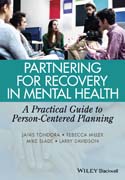
Partnering for Recovery in Mental Health: A Practical Guide to Person–Centered Planning
Tondora, Janis
Miller, Rebecca
Slade, Mike
Davidson, Larry
Partnering for Recovery in Mental Health is a practical guide for conducting person and family–centered recovery planning with individuals with serious mental illnesses and their families. It is derived from the authors’ extensive experience in articulating and implementing recovery–oriented practice for state and national mental health systems. It has been tested with roughly 3,000 providers who work in the field as well as with numerous post–graduate trainees in psychology, social work, nursing, and psychiatric rehabilitation. It has consistently received highly favorable evaluations from health care professionals as well as people in recovery from mental illness. This guide represents a new clinical approach to the planning and delivery of mental health care. It emerges from the mental health recovery movement, and has been developed in the process of the efforts to transform systems of care at the local, state, and national levels to a recovery orientation. It will be an extremely useful tool for planning care within the context of current health care reform efforts and increasingly useful in the future, as systems of care become more person–centered. Consistent with other patient–centered care planning approaches, this book adapts this process specifically to meet the needs of persons with serious mental illnesses and their families. Partnering for Recovery in Mental Health is an invaluable guide for any person involved directly or indirectly in the provision, monitoring, evaluation, or receipt of community–based mental health care. INDICE: Module 1: What is mental health recovery and how does it relate to person–centered care planning? Module 2: Key principles and practices of person–centered care planning Module 3: Preparing for the journey: understanding various types of recovery plans and orienting participants to the PCCP process Module 4: Strength–based assessment, integrated understanding, and setting priorities Module 5: Creating the plan through a team meeting Module 6: Documentation of PCCP: writing the plan to honour the person and satisfy the chart Module 7: So you have a person–centered care plan, now what? Plan implementation and quality monitoring Module 8: PCCP Implementation: common concerns & person–centered responses
- ISBN: 978-1-118-38857-0
- Editorial: Wiley–Blackwell
- Encuadernacion: Rústica
- Páginas: 248
- Fecha Publicación: 18/07/2014
- Nº Volúmenes: 1
- Idioma: Inglés
- Inicio /
- /
